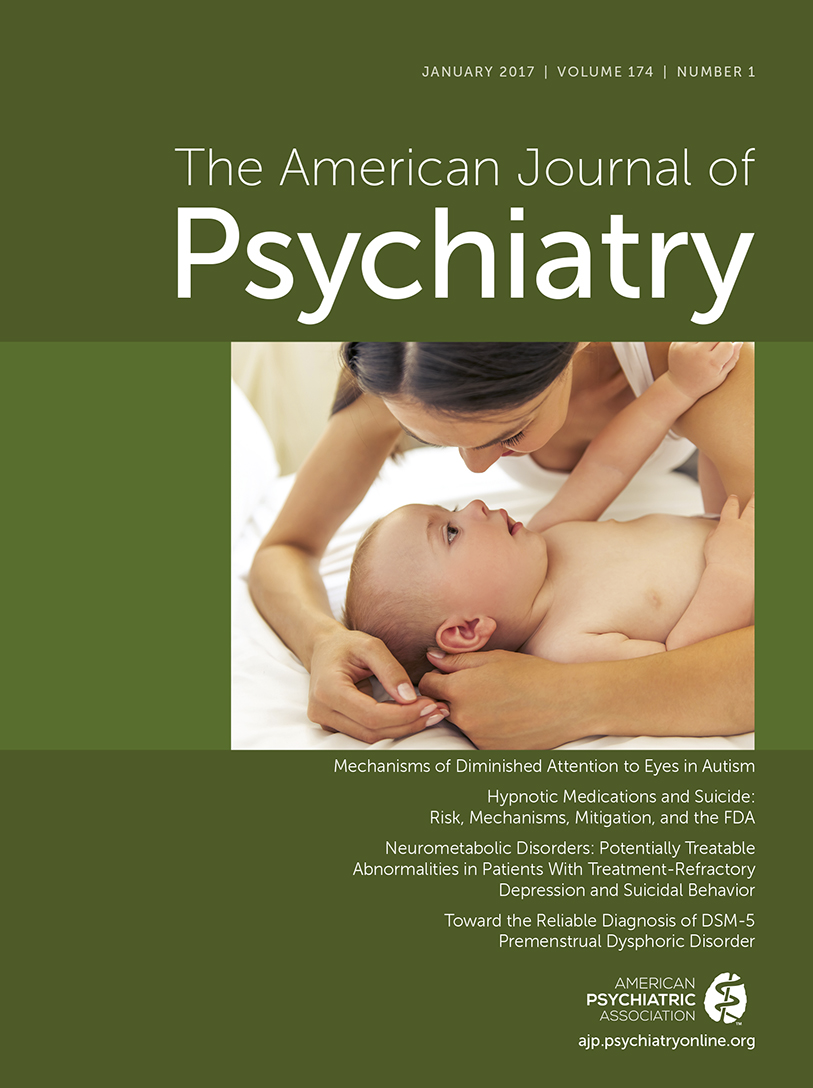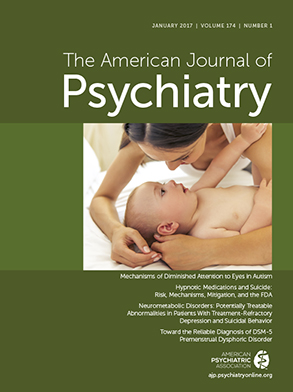Psychiatrists and other mental health clinicians are increasingly tasked with the evaluation and treatment of patients with major depressive disorder who have experienced an insufficient response to one or more first-line antidepressant medications. At first glance, antidepressant medication resistance seems to offer a clinically meaningful illness phenotype and a potential strategy for constraining the substantial heterogeneity of major depression. However, there is scant evidence that treatment-resistant depression represents a more homogeneous biological subgroup compared with individuals with major depression whose illness is less resistant or who are treatment naive. Indeed, participants in typical pharmacological clinical trials of treatment-resistant depression may include individuals with widely disparate illness trajectories (age at onset, number of episodes, duration of episode), comorbidities, family histories, and cross-sectional symptoms. Patients may or may not have had any previous exposure to psychotherapy or neurostimulation therapies. Protocols for such studies require routine screening blood tests for liver and kidney function but no measures associated with antidepressant medication resistance, such as inflammatory markers (
1). Given the lack of a unifying neurobiological framework for treatment-resistant depression (and many other CNS disorders), it is not surprising that the field has struggled to develop novel therapies (
2).
In this issue of the
Journal, Pan and colleagues (
3) report on the systematic metabolomic evaluation of 33 patients with treatment-refractory depression for primary and secondary disorders of CNS metabolism. The findings suggest that metabolic abnormalities measured in cerebrospinal fluid (CSF) may be markers of previously unrecognized pathology in treatment-resistant depression and therefore warrant evaluation. Although the study is clearly preliminary because of its small sample size and several limitations (discussed below), the findings raise issues with immediate relevance to clinical practice.
The study was inspired by the intriguing case of a 19-year-old man with chronic and severe treatment-resistant depression who was found to have deficient CSF levels of tetrahydrobiopterin intermediates, which function as cofactors for monoamine neurotransmitter synthesis. This patient subsequently responded to treatment with sapropterin, a tetrahydrobiopterin analogue, approved by the U.S. Food and Drug Administration for the treatment of phenylketonuria, that reduces elevated blood phenylalanine levels. Examination of five additional adolescents with treatment-resistant depression revealed a metabolic profile characteristic of cerebral folate deficiency (CFD)—normal blood levels of folate coupled with low CSF levels (<40 nmol/L) of 5-MTHF (methyltetrahydrofolate). The authors hypothesized that the incidence of metabolic abnormalities in a larger group of patients with treatment-resistant depression would be greater than in healthy comparison subjects.
The study sample comprised adolescents and adults up to age 40 who had failed to respond to at least three maximum-dosed antidepressants prescribed for an adequate duration. On average, the patients reported early onsets of illness (a mean age of 12 years), long episode durations, and strong family histories of depression, and half reported at least one suicide attempt. Depression severity at screening was in the moderate to severe range. The test battery included seven metabolites believed to be CNS specific, some of which are implicated in monoamine metabolic pathways, such as homovanillic acid (HVA) (from dopamine) and 5-hydroxyindoleacetic acid (5-HIAA) (from serotonin). Importantly, the patients in the study did not manifest any overt neurological signs or symptoms, and they did not appear to have any history of intellectual disability, neurodevelopmental disorders, or epilepsy.
Approximately two-thirds of the patient group showed at least one metabolic abnormality, whereas none of 16 healthy comparison subjects had abnormalities. CFD was the most common finding, observed in 12 of 33 (36%) depressed patients. The next most common abnormality, seen in five cases, was in the acylcarnitine profile. The patients with CFD were treated openly with folinic acid for a minimum of 6 weeks while remaining on their ongoing antidepressant regimen. Some CFD patients showed dramatic symptomatic improvement, including a patient whose Beck Depression Inventory score went from 43 to 0 (over a 79-week treatment period), while others showed only marginal improvement.
The prevalence of CFD in this cohort of treatment-resistant depression was striking. It is noteworthy that all but two of the patients with CFD had CSF 5-MTHF levels between 31 and 40 nmol/L (with the lower limit threshold of 40 nmol/L based on clinical laboratory norms), and none of the eight patients with genetic testing had mutations in the cerebral folate receptor gene (FOLR1). As the authors state, secondary causes of CFD due to systemic conditions were unlikely because these individuals did not suffer from neurological or systemic manifestations.
There was no clear relationship between a history of suicide attempt and CFD or the other metabolic disorders. Suicide has been associated with dysregulation of the kynurenine pathway, including elevated levels of quinolinic acid, a promotor of oxidative stress and an
N-methyl-
d-aspartate receptor agonist, relative to picolinic acid, a quinolinic acid antagonist, perhaps due to low-grade inflammation (
4). Xanthurenic acid, a kynurenine metabolized in the brain along the same pathway as quinolinic acid, is a potent inhibitor of sepiapterin reductase, the tetrahydrobiopterin-producing enzyme (
5). This suggests an association between kynurenine pathway dysregulation and changes in some of the metabolic pathways studied by Pan and colleagues, even without genetic sequence abnormalities in those pathways. It should be noted, however, that sapropterin treatment for the one CFD patient with a low CSF tetrahydrobiopterin level had only marginal effects of both suicidal ideation and depression.
What are the implications of this study for clinicians? Regarding evaluation procedures, it is not cost-prohibitive or particularly controversial to include serum folate and B
12 levels in the routine assessment of patients with treatment-resistant depression, as the authors suggest. A more difficult question is whether to routinely obtain blood levels of inflammatory markers such as C-reactive protein and interleukin 6, intermediates in the folate pathway such as homocysteine, or amino acids such as glycine. Glycine, an inhibitory amino acid found extensively in brain and spinal cord, is particularly interesting because blood levels have shown predictive value for response to both conventional antidepressants (
6) and novel approaches such as high-dose
d-cycloserine (
7). Should clinicians routinely conduct genetic testing for MTHFR (methylene-THF reductase)? An even more difficult question is when to consider an evaluation of CSF metabolites or referral to a biochemical geneticist. The Pan et al. study does not provide definitive answers to these questions, although the two-thirds prevalence of at least one type of metabolic abnormality suggests that these diagnoses may be more common in psychiatric settings than is generally appreciated, providing a reasonable argument in favor of broader testing of metabolic function in treatment-resistant cases.
The issue of whether clinicians should empirically treat patients with folate or one-carbon cycle agents (such as methylfolate) is complex. In favor of this approach, these treatments are generally safe, well tolerated, and likely to be viewed favorably by patients. A recent meta-analysis of adjunctive nutraceuticals for major depression found inconclusive efficacy for folic acid, although methylfolate and folinic acid were “tentatively recommended” (
8). However, empirical treatment for CFD poses tactical dilemmas.
l-Methylfolate is likely insufficient for CFD because the deficit in folate metabolism is earlier in the metabolic pathway, and treatment falsely corrects the CSF test (this is also the case with folinic acid treatment). Rational targeting of metabolic pathways may ultimately require combination approaches; a nutraceutical formulation (combining
S-adenosylmethionine [SAMe], ethyl-EPA, zinc, folinic acid, and 5-HTP) is currently under investigation for patients with antidepressant-resistant major depression (
9).
This study should be evaluated in light of several limitations. The sample was small, with minimal racial and ethnic diversity, and it was recruited from a single academic medical center. Subsequent larger studies should enroll adolescent comparison subjects, who were not recruited for this study because of concerns about the risks of lumbar puncture, a greater than minimal risk procedure. However, assessment of plasma and urine metabolites could be conducted safely. Future studies should also assess medication-free patients, as numerous medications (as well as alcohol, tobacco, and caffeine) may have an impact on these metabolites. Regarding the treatment outcomes, because of the high variability in the interval from baseline to posttreatment assessments, the open-label nature of the treatment, and the fact that adjustments could be made in concurrent medications, the results should be viewed with appropriate caution. Robust placebo responsivity, even in patients with treatment-resistant depression with relatively severe symptoms, remains a significant challenge for drug development (
10). Finally, an expanded sample that includes asymptomatic adolescents at high familial risk for bipolar disorder as well as symptomatic patients with bipolar disorder can provide transdiagnostic insight into the neurobiology of adolescent-onset depression.

